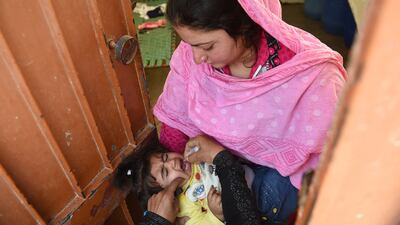Karachi // In a rundown district of Karachi, Rabia balks at a neighbour’s proposal to vaccinate her children, demonstrating one of the biggest hurdles to eradicating polio in Pakistan by the end of the year: confused and frightened parents.
Rabia, perplexed and surrounded by children in her modest home, voices fears the vaccine to the crippling disease may in fact cause infertility.
“She was afraid there might be some harmful elements in the vaccine,” said Sharmeen Aslam, neighbourhood supervisor of a team of vaccinators.
“I told her there weren’t. Now, since I live here, she knows she can come and see me if there are any problems. Now she believes me.”
Each month, Ms Aslam and her team divide a handful of dusty streets, each going door to door armed with nothing but their anti-polio drops.
She is part of a 2,500-strong community vaccination programme launched in the country’s biggest city two years ago to ease distrust and suspicion from parents by using staff from their local area.
Pakistan’s anti-polio campaign has long been a dangerous task. One hundred people – both police and health workers – have been killed in attacks targeting polio vaccination campaigns since 2012, including three in Korangi in eastern Karachi in 2014, who were not part of the programme.
Pakistan is one of only two countries where polio remains endemic – the other being war-torn Afghanistan.
Some Taliban and ultra-conservative religious leaders spread rumours that the vaccine contained ingredients forbidden in Islam, such as pork derivatives, or that could cause infertility as part of a western plot to reduce the country’s 200 million population.
Vaccinators are accused of being paid spies, a widespread suspicion which only intensified after the CIA used a fake vaccination campaign to help track down former Al Qaeda leader Osama bin Laden in northern Pakistan in 2011.
To dispel doubts, in 2014 the Sindh Emergency Operation Centre began hiring Karachi women to do the vaccinating.
A vaccinator marks each door with a chalk “R” if the inhabitants refuse vaccinations, and darkens the pinky fingernail of vaccinated children with a black marker, indicating drops have been administered.
Pakistan’s goals are ambitious: authorities want to vaccinate 35 million children under the age of five, eradicating the crippling childhood disease by the end of this yeae.
Authorities are now targeting the main geographical incubators of the disease, the tribal areas bordering Afghanistan and the province of Khyber Pakhtunkhwa in the north-west.
Vaccinators had previously found it almost impossible to penetrate the remote tribal areas, where militants had operated with impunity.
But a major Pakistani military operation against extremists there is giving authorities new leverage – such as refusing to allow families through checkpoints unless they allow their children to be vaccinated.
These measures saw the number of new polio cases drop to 54 last year, down from 306 new cases in 2014.
More than 2,000 religious leaders have also joined in the fight, trying to persuade people to have their children vaccinated.
Authorities have also built more than 2,500 clinics in Karachi providing vaccines along with basic care.
The strategies seem to be working: in Karachi, the number of refusals was slashed fourfold last year to about 10,000.
But the gains are fragile.
Six cases have been reported so far in Pakistan this year, including a child who had already been vaccinated, fuelling parents’ mistrust of the drops.
* Agence France-Presse

